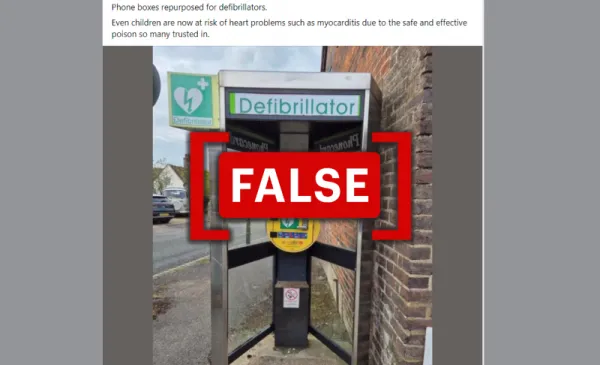By: Arron Williams
May 3 2024
 Source: Facebook
Source: Facebook
Defibrillators being placed in U.K. phone boxes predates the COVID-19 vaccines and the pandemic. This practice is not related to the vaccine.
Context
Anti-vaccine posts on Facebook and X (formerly Twitter) have linked defibrillators being placed in U.K. phone boxes to the COVID-19 vaccine. These posts claim phone boxes are being repurposed with defibrillators inside because there have been higher rates of myocarditis since the COVID-19 rollout, and state that COVID-19 vaccines are responsible for heart problems and harmful side effects.
A Facebook post, with over 1,000 views, further references the vaccines, saying, "Even children are now at risk of heart problems such as myocarditis due to the safe and effective poison so many trusted in." An X post with over 64,000 views also shares the image and states "I stand corrected, if I had taken successive experimental government-endorsed vaccines, I also would want these on every street corner."
Screenshots of the posts. (Source/Facebook/X)
In fact
Defibrillators have been placed in public places throughout the U.K., including phone boxes, for years before the COVID-19 vaccine rollout. According to the Minutes Matter website, which features a map of phonebox locations in the U.K., 784 phone boxes have been repurposed.
According to a 2019 defibrillator guide, in 1999, the U.K. government led a "Defibrillators in Public Places Initiative." This initiative promoted the use of defibrillators by people other than health experts and the placement of devices in railway stations, airports, and other public locations. The intention was to place them in accessible, prominent positions with clear signs so they could be used in cases of cardiac arrest as quickly as possible.
Several news articles about these initiatives also long pre-date the COVID-19 vaccine rollout. In 2012, a defibrillator was installed in a phone box in a village in Oxfordshire by parents following the death of their son from sudden heart failure.
The Community Heartbeat Trust teamed up with British Telecom (BT) to transform decommissioned phoneboxes in rural areas to house defibrillators in 2016, creating more than 160 defibrillator phoneboxes.
BT has previously reported that public phoneboxes were becoming redundant due to "phenomenal growth in mobiles," and since 2008 has transformed more than 6,600 defibrillator points and other local services.
The Community Heartbeat Trust website also features a section on converting phoneboxes to house defibrillators.
Martin Fagan, the national secretary of the Community Heartbeat Trust, told Logically Facts that the "placement of defibrillators in phoneboxes started 10 years before COVID – it has nothing to do with COVID. The uptick in phoneboxes being repurposed to house defibrillators has been the same before and after COVID."
He further explained that automated external defibrillators (AEDs) "are used to treat cardiac arrest – you can save someone's life by following the chain of survival." Fagan said that the placement of defibrillators in phoneboxes makes them more accessible, and that "over the last 15 years, the survival rate from cardiac arrest has increased to 25 percent."
According to the British Heart Foundation (BHF), there is a link between mRNA COVID-19 vaccines and an increased risk of myocarditis and pericarditis, but the risk is low and rare. The BHF also states that research shows COVID-19 is more likely to cause myocarditis than the vaccine.
The BHF also states that "People who are vaccinated against COVID-19 also have a much lower risk of getting other serious heart complications caused by the virus, including heart attack and stroke."
Claims that there has been a significant rise in heart-related medical issues following the COVID-19 vaccine rollout are unsubstantiated. Logically Facts has previously fact-checked various claims about vaccines causing heart attacks and found them to be misleading or false.
The verdict
In the U.K., defibrillators were placed in phone boxes years before the COVID-19 pandemic and vaccine rollout. The increase of defibrillators in phone boxes is not connected to vaccines. Therefore, we have marked this claim as false.